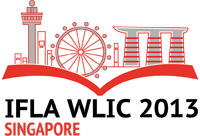Call for Papers
Information Technology Section
& Preservation and Conservation Section
& Rare Books and Manuscripts Section
& Library and Research Services for Parliaments Section
Theme:
Preserving for the future: integrating physical and digital preservation
Nowadays libraries contain both physical documents, and digital copies (often derived from physical holdings from the same institution) and a rapidly increasing amount of digital born documents. In order to care for the different type of objects for long term preservation/ongoing curation and to enable access long term there are different workflow / processing routines in place. Funding and resources are limited and this leads to the need to prioritize actions in a the strategic and pragmatic way. In this context the digitization process, for example is an opportunity to get the best possible results and efficient in a comprehensive manner, by integrating the process of both digitization and preservation of library material. This demands a good integration of the process of both physical and digital preservation. On a very broad scale this requires looking at the role of the physical and the digital copy, preservation policy and strategy, working routines around physical objects, management of digital objects, access guidelines, decision-making tools, staffing experience, and integrated workflow.
We invite papers from different fields of expertise about different media, best practice and strategic thinking. The contributions should provide practical experiences and examples based on current processes and policy. Attention should be given especially to funding efficiency and resource sharing in conjunction with organizational development and capacity building.
Keywords: preservation, digital preservation, digitization, (role of) physical restoration, conservation, workflow, multimedia, digital born, best practice, integration, case studies, policy, strategy, decision-making tools, access, curation, deacidification, cost comparison, conservation organization, roles sharing, complementarity
Presenters will have 20 minutes to deliver their presentation, followed by time for questions and discussion.
There will be simultaneous interpretation.
Submission Guidelines
Proposals for presentations should be in English and include:
- title of the paper;
- detailed abstract of the paper (no more than 500 words)
- speaker's name, address, telephone and fax numbers, professional affiliation, e-mail address, and a brief biographical statement of no more than 50 words.
E-mail proposal should be sent to:
Arthur Tennøe
E-mail: arthur.tennoe@nb.no
Please indicate "IFLA 2013 Singapore proposal" in the subject line.
Important dates
| February 20, 2013: | Proposal submission |
| March 4, 2013: | Notification of acceptance |
| May 30, 2013: | Deadline for submission of final paper |
Contact
For additional information on this call for papers you may contact:
Alenka Kavčič-Čolić
Chair, Information Technology Section
E-mail: Alenka.Kavcic@nuk.uni-lj.si or
Arthur Tennøe
Preservation and Conservation Section
E-mail: arthur.tennoe@nb.no
Submissions
All proposals must be in before 20 February 2013.
Please note
All expenses, including registration for the conference, travel, accommodation etc., are the responsibility of the authors/presenters. No financial support can be provided by IFLA, but a special invitation can be issued to authors.
Congress Attendance Grants
The Singapore National Committee and IFLA have worked hard to secure funds for Conference Participation Grants. Up-to-date information will be available on our Conference Participation Grants webpage.
Last update: 13 January 2013
---




